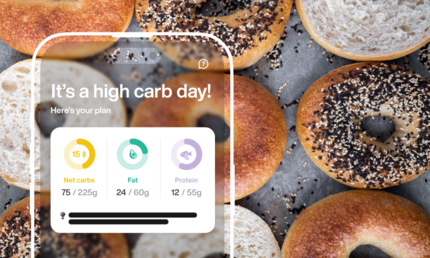Carb Cycling for Weight Loss - A Beginner's Guide


Many people have that love-hate relationship with carbs, enjoying their delicious taste but feeling guilty about consuming them. As a controversial topic regarding weight loss and overall health, it's not the carbs themselves that are the problem, but rather the quantity and quality of carbs consumed and how they impact our metabolism.
While we know that consuming too many refined carbs, such as white bread, pasta, and sugary snacks, may lead to weight gain, and may cause other health problems, most of us are guilty of this. In fact, according to this study (1), low-quality carbs still account for 42% of daily calories, while high-quality carbs — such as whole grains and fruits — only account for 9%.
But, there are ways you can 'carb' in a beneficial way! Let's dive in
Carbs are one of the three macronutrients, along with protein and fat, that the body needs for energy. They provide fuel for the brain and muscles, so they are essential for overall health and well-being.
For this reason, people choose to vary their carbohydrate intake from day to day or strategically time their intake around activities (like exercise) where they need them, AKA carb cycling. As a result, the body becomes more efficient at using carbs for energy, and the metabolism becomes more flexible.
As an effective way to burn fat, boost your metabolism, and reach your weight-loss goals, this strategy has several other potential benefits. With a personalized nutrition plan that can tie your dietary needs to your metabolism - you will be able to determine when your body needs a low, medium, or high-carb day.
Carb cycling is a way to eat that alternates between high-carb and low-carb days. It's not a diet but rather a way of eating.
Doing this helps keep your body guessing, making it easier to lose weight and keep it off long-term.
The idea behind carb cycling is to give the body the carbohydrates it needs on high-carb days to fuel workouts and replenish glycogen stores, while on low-carb days, the body relies on stored fat for energy.
Carb cycling is an approach to dieting that involves alternating between high-carb and low-carb days, and it can have a significant impact on your metabolism. The principle behind carb cycling is to maximize the benefits of carbohydrates for energy and recovery on physically active days, and to encourage the body to burn fat as fuel on less active days.
This dietary strategy can help to improve metabolism by ensuring it remains active and adaptable. During high-carb days, the body's metabolism can increase due to the energy required to process the carbohydrates, known as the thermic effect of food.
On low-carb days, the scarcity of carbohydrates prompts the body to metabolize fat for energy, leading to weight loss and a more efficient metabolic function. Therefore, carb cycling not only gives a blueprint on how to improve metabolism but also accommodates the body's varying energy needs in harmony with its physiological responses.
Helping regulate blood glucose levels. This can help balance cravings and help you better reach fat burn. Reduced cravings and thus a reduced caloric intake can help with losing weight or breaking through a weight loss stall.
If there is too much glucose circulating in your bloodstream at once, due to excessive carb intake, then some will be stored as fat rather than burned off as energy because there isn't enough space left in our cell's storage facilities (called "mitochondria").
Limiting your carb intake on certain days can also help you limit the overconsumption of carbs and thus calories. For weight loss, overall caloric intake is essential.
Lumen metabolic experts explain that carb cycling balances out these peaks and valleys of insulin release so that more fat can be used instead of stored away!
Carb cycling is also a great way to gain muscle. It can also help improve your health, endurance, athletic performance, and mental focus.
It's important to note that carb cycling is not the same thing as low-carb diets or ketogenic diets (which are both very different from carb cycling). These other diets have their own benefits, but may not be suitable for everyone who wants to try carb cycling.
The body responds to a high-carb diet by producing insulin, which is a hormone that tells your cells to take up sugar from your blood. This process is called "glucose disposal." When you eat a surplus of carbs, your muscles and liver store the excess glucose as glycogen (a type of energy storage molecule).
When you reduce your carb intake, your body must find another way to burn fat for energy rather than using sugar from carbohydrates or protein.
You can structure your carb cycling in a number of ways. The most common method is to alternate between high-carb days and low-carb days, but you can also alternate between high and low weeks. This means that you'll consume a high amount of carbs one week, then very few the next. When you take your morning breath measurement, your personalized nutritional plan will adjust to what macros your metabolism needs in real-time.
The amount you're eating each day or week depends on your goal: if you're trying to lose weight or maintain weight loss (a "fat burner"), then your daily intake should be at a caloric deficit.
If your goal is muscle growth ("gainer"), then you will want to eat a surplus of overall macros per day, but make sure to balance the carbs and allow them to fit into your low and high-carb days.
Those who just want their body composition balanced or to maintain their weight may find themselves somewhere in between these two extremes – that is, eating enough protein to make sure you maintain muscle while losing body fat. It may take some trial and error for a couple of weeks, but using a personalized nutritional plan that gives you accurate biofeedback on your metabolism will remove the guesswork of understanding what your body needs in order to achieve your goals.
Top tips from our Lumen experts:
Because carb cycling is a diet strategy alternating between high-carb days and low-carb days, on workout days, you'll need to eat more carbohydrates than you normally would; on rest days, you'll consume fewer carbs than usual. The goal is to keep your body guessing, so it never gets used to any one way of eating--and that means you'll see better results!
First things first: use a macro tracker to calculate how many grams of moderate carbohydrates (or net carbs) you should eat based on your body weight.
Again, be patient with yourself and know that you may need to stick to a consistent carb cycle for a couple of weeks before making changes to see what macros work for your body.
Related post: Healthy Eating Habits for Optimal Nutrition
The recipes listed here are perfect for those who want to lose weight by eating clean meals that will keep you energized throughout the day. Each recipe has been designed with carb cycling and metabolic health in mind—allowing you to get the most out of this lifestyle change!
Greek Chicken Salad
Ingredients
Chop, dice and mix all the ingredients together and enjoy!
Garlic Salmon and Broccoli
Ingredients
You can either air fry, bake or cook the broccoli on the stove with a drizzle of olive oil. Chop the garlic, add to a pan on the stovetop and saute. Spread a generous amount of salt and pepper on the salmon and add to the garlic pan. Cook for 4 minutes each side!

Chicken Enchilada Bowls
Take a look at the recipe below, and then we'll break down how to make it.
Saute all ingredients, cook rice (about 1 cup). Once the veggies and meat are cooked, add together in one pan and drizzle teriyaki sauce. Mix in one bowl with the rice and bon appetit!
Who would have thought carb cycling could help impact the quality of sleep! But it does. By getting into the healthy habit of eating fewer carbs on days when your workouts are less intense and higher in carbs on days when they are more intense, you'll get the energy boost needed during those intense workouts. You will also be able to manage blood sugar levels throughout the day without experiencing any negative side effects like crashing! This is great news for optimizing your metabolism!
Carb cycling also causes you to become more aware of when you are eating your carbs so that you can pay closer attention to which days you have more energy and a more restful night's sleep!
Carbohydrates are often blamed for causing weight gain, but research shows that this isn't true! In fact, eating healthy carbohydrates can actually help relieve stress by increasing serotonin production, which improves mood control and decreases symptoms associated with depression or anxiety. The trick is to know how much energy you are burning and cycling in your high and low carb days to match that expenditure.
By now, you should have a good idea of what carb cycling is and some of the benefits it can have on your body and your metabolism. Carb cycling is an effective way to lose weight and keep it off as long as you're in a caloric deficit. It's also beneficial for those who are trying to lose weight but still want to enjoy some carbs.
Having a structure for your own carb cycling meal plan will keep you on track, form a healthy habit with foods, and ensure that you’re eating the correct amount of macros for your specific goals - whether it's to gain muscle or lose fat!
Answer: Yes, carb cycling can benefit fat loss by helping the body to utilize carbs for energy and recovery on active days and switching to using fats for energy on low-activity days. Carb cycling also helps to manage insulin release better, which helps to limit the amount of carbs our body stores as fat [15].
Answer: Anyone can benefit from carb cycling however, if you are trying to lose weight or optimize your metabolism this can be a very helpful tool. Not only can carb cycling help fuel performance, but it’s a great way to achieve sustainable weight loss [16].
Answer: The best carb cycling schedule will vary by individual based on their specific goals. Carb cycling can be done on a daily or weekly schedule. For example, someone who does heavy activity every other day may consider alternating between high-carb intake on exercise days and low-carb intake in between to support performance and recovery.
Answer: If you are new to carb cycling, it can be helpful to start by downloading a macro tracker to help you determine how many grams of carbs you need based on your current weight. Next, you want to consider your exercise habits and start with higher carb intake on exercise days and lower carb intake on non-exercise days based on your specific macro ranges [17, 18].
Brian St. Pierre, M. S. (2022, June 24). Carb Cycling: Is this advanced fat loss strategy right for you? Precision Nutrition. Retrieved February 21, 2023, from https://www.precisionnutrition.com/all-about-carb-cycling
Google. (n.d.). The Everything Guide to the carb cycling diet. Google Books. Retrieved February 21, 2023, from https://books.google.com/books?hl=en&lr=&id=N33rDQAAQBAJ&oi=fnd&pg=PT25&dq=carb%2Bcycling&ots=6S5xB_eUqq&sig=BvrNYJEokLvit51V8VrTxG4c4kY#v=onepage&q=carb%20cycling&f=false
MediLexicon International. (n.d.). Carb cycling: Benefits, evidence, and how to do it. Medical News Today. Retrieved February 21, 2023, from https://www.medicalnewstoday.com/articles/carb-cycling
Volek JS, Noakes T, Phinney SD. Rethinking fat as a fuel for endurance exercise. Eur J Sport Sci. 2015;15(1):13-20. doi: 10.1080/17461391.2014.959564. Epub 2014 Oct 2. PMID: 25275931.
Adamska-Patruno E, Ostrowska L, Goscik J, Pietraszewska B, Kretowski A, Gorska M. The relationship between the leptin/ghrelin ratio and meals with various macronutrient contents in men with different nutritional status: a randomized crossover study. Nutr J. 2018 Dec 28;17(1):118. doi: 10.1186/s12937-018-0427-x. PMID: 30593267; PMCID: PMC6309055.
Gower BA, Goss AM. A lower-carbohydrate, higher-fat diet reduces abdominal and intermuscular fat and increases insulin sensitivity in adults at risk of type 2 diabetes. J Nutr. 2015 Jan;145(1):177S-83S. doi: 10.3945/jn.114.195065. Epub 2014 Dec 3. PMID: 25527677; PMCID: PMC4264021.
Escobar KA, Morales J, Vandusseldorp TA. The Effect of a Moderately Low and High Carbohydrate Intake on Crossfit Performance. Int J Exerc Sci. 2016 Oct 1;9(3):460-470. PMID: 27766133; PMCID: PMC5065325.

Abigail Markman holds a Master’s degree in Nutritional Sciences, underscoring her vast knowledge of nutrition and health. She has been a practicing Nutritionist for several years, driven by her passion for empowering people with valuable insights into balanced nutritional intake and lifestyle habits and their significant role in promoting overall well-being.